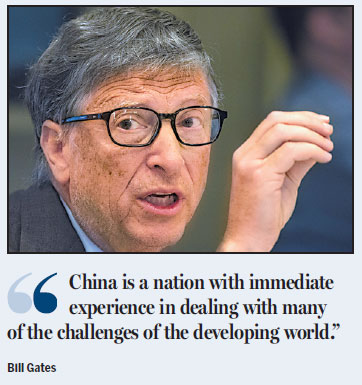

Q&A: Bill Gates, co-founder of Microsoft and co-chair of the Bill & Melinda Gates Foundation
President Xi Jinping and other global leaders will get together at the United Nations to agree on the Sustainable Development Goals. What is your view about that?
It is a great opportunity to take stock of how the world's poorest are doing, and there is a big push to spread the word about the SDGs. Melinda and I will be in New York to help get the news out. We believe these goals will make a big difference, as the world has already done something like this, and with great success. Fifteen years ago, world leaders adopted the Millennium Development Goals, which was one of the best ideas for improving lives that I've ever seen.
We are supportive of the new framework and the spirit of SDGs. Given our foundation's priorities and experience, we'll continue to focus our investments where we believe they can make the greatest impact - addressing the "unfinished agenda" of maternal, newborn and child mortality, eliminating gender inequities that limit the contribution of women, and helping farming families in the poorest countries increase their productivity.
What role will China play in implementing the SDGs? What influence will China bring to the world?
China is a nation with immediate experience in dealing with many of the challenges of the developing world. It accounts for much of the world's progress in meeting the MDGs on poverty reduction by lifting 600 million out of poverty in just 30 years. And it has led the world over the last 15 years in the annual rate of decline of maternal and child mortality.
China's public health assistance in West Africa during the Ebola epidemic is a sign of the country's growing willingness to take a leading role in tackling healthcare challenges in developing countries. Its innovation and low-cost manufacturing capacity are producing important technologies for global health, including new TB diagnostics, HPV screening technology, and coolers that can keep vaccines cold and safe, without external refrigeration, for more than a month.
China's increasing engagement in global development policy and financing is also a welcome addition. It played a leading role in the establishment of multilateral financial institutions such as the Asian Infrastructure Investment Bank and the New Development Bank. China's ambitious plan for international cooperation and its increasingly prominent role at APEC, G20 and other global forums is evidence that China is stepping up as a leader in global development.
The Bill & Melinda Gates Foundation has been committed to health and development around the world in the past decade. Any new targets and plans? Any opportunities for cooperation with China?
Our work in China today has two purposes: to continue supporting China in its efforts to address domestic challenges, and to support China as a stronger development partner for the rest of the world.
Our connection to China goes back to 2007, when we established our Beijing Representative Office and began working domestically on HIV prevention, tuberculosis control and tobacco control. It has been great to see the progress China has made on these challenges, as well as in development of the country's philanthropic sector.
Challenges do remain, however, and we are committed to continuing to work with our Chinese partners to address them. The high level of resistance to TB drugs in China is a particular concern.
We also are working with public and private sector partners to channel more Chinese innovation and expertise to countries in Africa and South Asia, including agricultural technologies and high-quality, low-cost vaccines.
You've mentioned a number of times that you and Melinda have no intention of keeping the Gates foundation running forever. Do you and Melinda still plan to shut it down one day? If so, when and why?
Before we even established our foundation, Melinda and I talked a lot about how we were going to take the wealth that we're lucky enough to have and give it back in a way that's most impactful to the world. We believe the best approach is to focus the foundation's work in the 21st century. What that means, specifically, is that the foundation will spend all of its resources within 20 years of our death.
This underscores our belief that it's important to do as much as possible, as soon as possible, to address the challenges we are focused on - eliminating extreme poverty, and improving the health and well-being of people everywhere.

(China Daily 09/28/2015 page2)